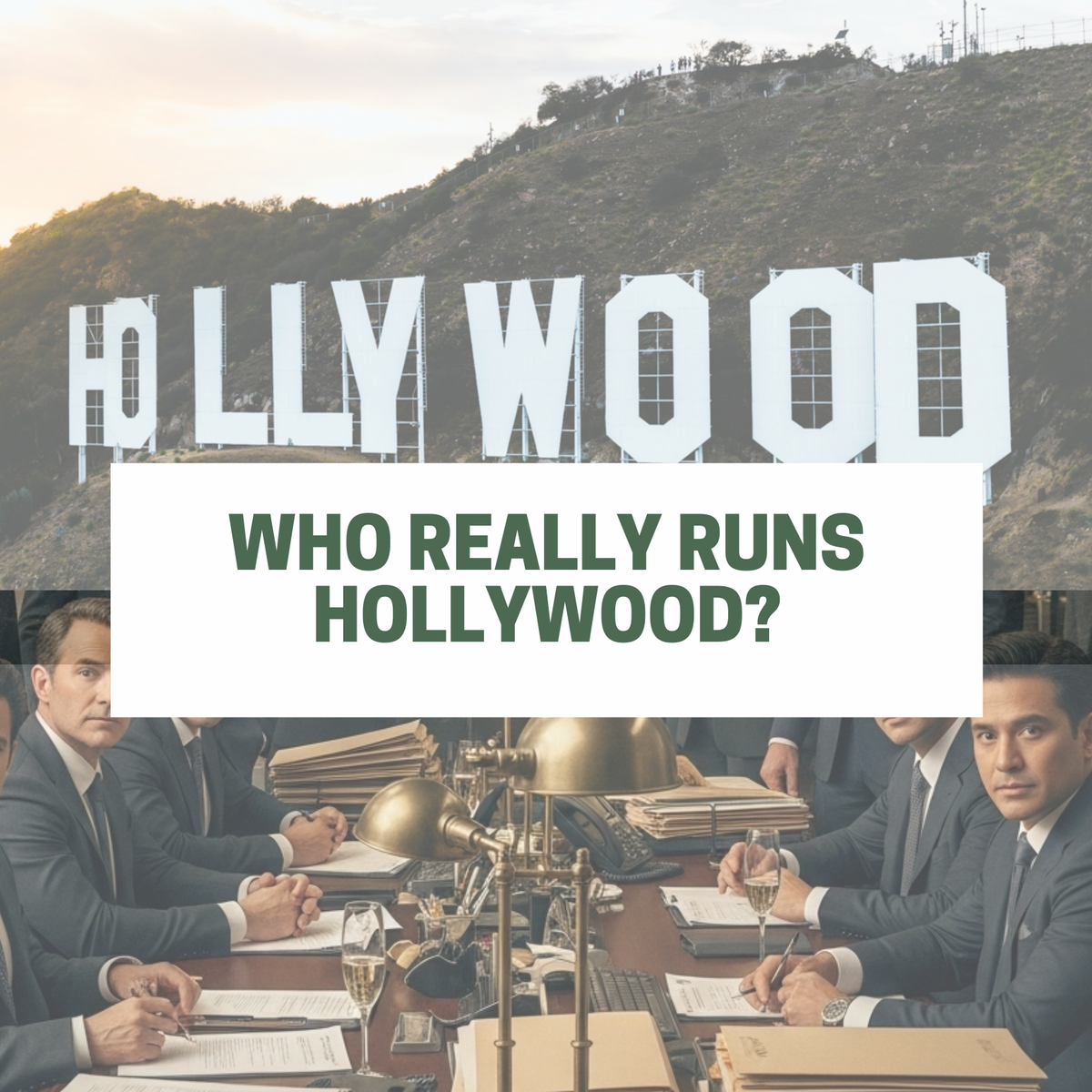Who Really Runs Hollywood? The Agents, Lawyers & Fixers You’ve Never Heard Of
From backroom boardrooms to courtroom settlements, Hollywood’s most powerful players aren’t on the red carpet they're behind it. Agents, lawyers, and crisis fixers now run the show in 2025, managing careers, scandals, and contracts with silent, calculated control.

Introduction
Hollywood is a dream machine, churning out red carpets, billion-dollar franchises, and Instagram-perfect stars. Behind the dazzle and the scandal, however, is an elite caste of agents, entertainment lawyers, and crisis fixers who really build careers, kill stories, and broker power. These are the architects of fame and silence working out of glass towers, private jets, and legal chambers, seen little but felt everywhere.
In 2025, with the entertainment business experiencing seismic changes AI-written scripts, streaming glut, celebrity activism, and labor unrest the puppet masters behind the scenes are stronger than ever. This investigation reveals the agents, attorneys, and image manipulators who make up contemporary Hollywood, not by their name in lights, but by their ability to control those who are.
1. The Power Brokers: Mega Agencies That Control Talent and Content
Hollywood talent agencies are no longer merely middlemen. They are empires. CAA (Creative Artists Agency), WME (William Morris Endeavor), UTA (United Talent Agency), and ICM Partners are just some of the agencies that have evolved from talent managers to become vertically integrated conglomerates.
These agencies do not merely represent actors; they make films, package TV shows, arrange endorsement contracts, and broker intellectual property rights. Packaging the packaging of writers, directors, and actors into a single prepackaged product has empowered agencies over some studios. The WGA (Writers Guild of America) warred against agencies about this during the latter 2010s, and the earthquake effects continue to influence legal policy to this day.
CAA's 2023 acquisition by the French luxury conglomerate Artémis marked its global aspiration. It encompasses not only film and television stars, but also sports stars, influencers, musicians, even brand chiefs. This degree of representation has enabled mega-agents to become gatekeepers of access, deciding what talent sees what producers, and under what conditions.
Key Players: Bryan Lourd (CAA), Ari Emanuel (WME), Jeremy Zimmer (UTA)
2. Talent Raids and Agent Wars
The actual wars in Hollywood don't take place on screen—but on boardrooms. Talent agencies are infamous for staging midnight raids, poaching clients and agents from the competition with more perks, higher percentages, and cross-platform business. In 2015, UTA pulled off a mega-coup by stealing major clients and agents away from CAA, prompting lawsuits and temporary restraining orders.
These fights usually spill over into public and legal battles. But more frequently than not, they're resolved in private with buyouts and clandestine contracts. For stars on the rise, the agency you sign with can make your career. For veterans, it may determine if you fade from view or become a six-picture franchisee.
3. Entertainment Lawyers: The Dealmakers & Defenders
Whereas agents peddle the sizzle, entertainment lawyers guard the steak. Hollywood's most powerful lawyers work like wartime generals negotiating blockbuster deals, burying scandals, representing clients in court, and at times making preemptive legal strikes.
These attorneys don't merely read contracts; they place calls that maintain reputations. If a studio executive needs to remove a troublemaker director or a celebrity needs to sue a reporter for libel, the attorney is the initial and final phone call. They also negotiate backend issues, streaming bonuses, and IP rights serving as the linchpin in today's content fragmentation economy.
Law firms such as Loeb & Loeb, Ziffren Brittenham, and Clare Locke LLP are the crème de la crème of Hollywood legal brawn. With AI-made content soon to become a part of copyright law, these attorneys are setting the stage for what the future holds for entertainment law.
4. The PR Crisis Architects: Reputation Management in the Social Media Age
If Hollywood lawyers can manage the courts, PR crisis managers manage the court of public opinion. These are usually ex-politicians, lawyers, and ex-journalists who employ moves that would make TV show characters like Olivia Pope seem old-fashioned.
Crisis PR firms such as Red Banyan, 42West, and Sunshine Sachs help celebrities navigate everything from sex scandals and racism accusations to mental health crises and botched interviews. In 2025, with cancel culture as volatile as ever and misinformation spreading in minutes, these consultants operate 24/7.
Crisis consultants don't merely spin that's old-school stuff they game social media algorithms, manage influencer campaigns, and bully publishers with cease-and-desist letters. When a top star is accused of abuse or a streaming CEO utters some tone-deaf remark, these are the individuals scrubbing Google search and running the apology tour.
5. The Fixers: Legal & Moral Grey Zones
Real "fixers" as they're called in entertainment law and PR circles—typically walk the line between lawyer, publicist, and private investigator. They're contracted for what they can keep out of the headlines, not for what they can spin. In high-profile court cases, fixers have been known to pay witnesses, set up NDAs, bury police reports, and ghostwrite public statements.
Though these tactics live in a gray area of the law, they are still widespread. As long as they don't veer into blackmail or perjury, fixers balance on the edge between reprehensible and brilliant. Hollywood is not constructed on openness—it's constructed on entry, management, and narrative control.
6. Who Controls the Narrative?
These fixers, lawyers, and agents create an ecosystem. When a celebrity scandal erupts, a lawyer assesses liability, a PR firm shapes the response, and the agent insures future earnings won't be damaged. This control triangle money, image, law insures Hollywood's chaos is largely contained.
Even political and social activism gets run through this machinery. When celebrities get involved in activism, groups of experts screen their statements for brand safety, regional market acceptability, and long-term sponsor effect. Authenticity is genuine, but it is frequently run through legal drafts and media memos.
7. AI, Streaming, and the Next Legal Battlegrounds
While Hollywood struggles with synthetic voice licenses, deepfakes, and generative AI, lawyers and rights-controlling agents are changing fast. Synthetic likeness rights are now negotiated by agencies. Lawyers write terms to avoid unauthorized AI replication. Fixers cope with anger about AI replicated deceased actors.
Expect these experts to lead the next WGA-type labor negotiations. Already, PR agencies are framing narratives about AI use in film. By 2025, legal battles are less about contracts and more about identity, ownership, and techno-ethics.
8. Why They Matter More Than Ever
In the past, scandal would end a career. Nowadays, it can be commodified or repackaged. The professionals featured in this takedown don't only cover; they pivot. They set the terms for how fame is understood and how harm is undone.
If the 20th century was dominated by studios and directors, the 21st century is dominated by middlemen and women in suits. Those who realize that in an era of clicks and legal finickiness, power is more than glamour.
Sources
- CourtListener – Legal filings involving talent agencies and entertainment law cases
- Justia – Case law related to celebrity lawsuits and defamation
- Archive.org – Historical legal battles (WGA vs CAA/WME), media coverage archives
- Google Trends – Keyword analysis: "CAA power 2025," "Hollywood fixers," "celebrity lawyers 2025"
- Official Press Releases – Law firm announcements, PR firm statements, agency acquisitions
- The Guardian, Variety, Vox, The Hollywood Reporter – Verified industry reporting
For more legal exposes and truth-behind-glamour stories, subscribe to AllegedlyNewsNetwork.com




